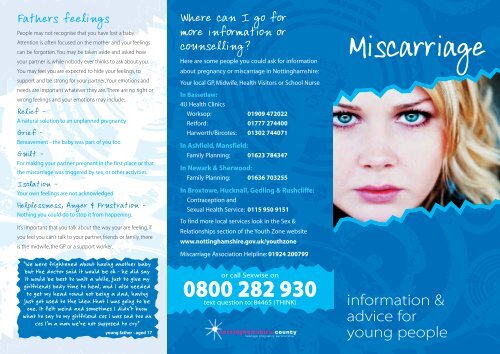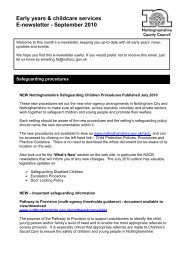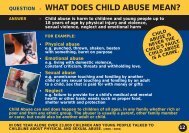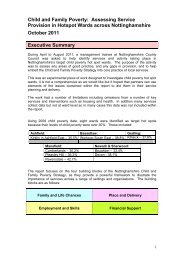Information and advice for young people leaflet: miscarriage
Information and advice for young people leaflet: miscarriage
Information and advice for young people leaflet: miscarriage
- TAGS
- miscarriage
You also want an ePaper? Increase the reach of your titles
YUMPU automatically turns print PDFs into web optimized ePapers that Google loves.
1078_MISCARRIAGE LEAFLET 26/7/07 8:44 pm Page 2Miscarriage can be a distressing experience. Apart fromthe emotional upset of losing a baby, your body has beenchanging in pregnancy <strong>and</strong> now has to return to normal.Changes inside your body can also affect the way youare feeling.This <strong>leaflet</strong> may answer some of the questions that youwanted to ask <strong>and</strong> didn’t know where to start.Your feelingsWhen you started to miscarry, you probably felt bothfrightened <strong>and</strong> helpless. There is usually nothing you can do toprevent it happening. Some <strong>people</strong> recover quickly, otherstake a longer time. You have lost a baby <strong>and</strong> are likely to feelsad <strong>and</strong> you may need time to grieve. You may feel relief, ifyou were unsure about your pregnancy. Some <strong>people</strong> may tryto avoid you because they are worried they may upset you.<strong>young</strong> woman - aged 17Why did I miscarry?Even though about 1 in 4 pregnancies end in <strong>miscarriage</strong>, it isusually difficult to know the exact cause. It can be hard toaccept that no one can say <strong>for</strong> certain why it happened. Thatmeans that it is not your fault – your <strong>miscarriage</strong> is unlikely tohave happened because of anything you did or didn't do.Un<strong>for</strong>tunately once a pregnancy starts to miscarry, there isvery rarely anything that can be done to stop it, however, it isimportant to see a doctor.In some <strong>miscarriage</strong>s the womb empties itself, in others thebaby dies but is not miscarried. A doctor may suggest thatyou have a small operation called a D & C to make sure thatyour womb is empty <strong>and</strong> to avoid infection.How long will I bleed <strong>for</strong>?You may bleed <strong>for</strong> up to two weeks <strong>and</strong> have cramping painsduring this time. The bleeding <strong>and</strong> any pain should slowlybecome less. If they become worse, if there is an unpleasantvaginal discharge or if you have a high temperature, contactyour doctor ASAP - these may be signs of an infection. It isbest to use pads rather than tampons <strong>and</strong> avoid having sexuntil the bleeding stops to reduce the risk of infection.Will this <strong>miscarriage</strong> affectmy chances of having ababy in the future?After a <strong>miscarriage</strong> there is a big chance that you could getpregnant straight away so you will need to talk to someoneabout contraception. Research shows that even if you haveseveral <strong>miscarriage</strong>s, you still have a good chance of havinga baby.<strong>young</strong> women - aged 16Remembering the babyyou have lostMany <strong>people</strong> want to do something to remember their babyor to help them say goodbye.You may want to find out whatyour hospital offers. In an early <strong>miscarriage</strong>, you may be ableto have a scan picture of your baby.In a late <strong>miscarriage</strong> the hospital may offer to takephotographs of the baby <strong>and</strong> will give them to you or keepthem <strong>for</strong> you in case you want them later or they may offer totake h<strong>and</strong> or footprints of your baby <strong>for</strong> you to keep.Your partnerYour partner is likely to feel upset because of the distress youhave gone through, as well as <strong>for</strong> the loss of your baby. Theway he grieves may be different from yours <strong>and</strong> he may findit hard to show his feelings.He has not experienced the same changes caused by thehormones of pregnancy <strong>and</strong> so may not feel the same aboutthe loss of your baby. He may not have seen a scan or felt thebaby kick.Your partner may concentrate on "being strong" <strong>for</strong> you <strong>and</strong>not show his own feelings <strong>and</strong> so he may appear not to care.He may seem to switch off <strong>and</strong> become busy with day-to-dayactivities.It may be that your partner is unsympathetic to your loss, orthat you don't have a partner. Perhaps your relationship hasbroken down as a result either of your pregnancy or of the<strong>miscarriage</strong> <strong>and</strong> you are facing the loss of both your baby<strong>and</strong> your partner. This can leave you feeling unsupported <strong>and</strong>alone - talk to someone who you trust, a family member, afriend or a health professional.












![Every Parent Matters [PDF 463KB] - Nottinghamshire County Council](https://img.yumpu.com/47250686/1/184x260/every-parent-matters-pdf-463kb-nottinghamshire-county-council.jpg?quality=85)


![School Employee Domestic Violence and Abuse Policy [PDF 228KB]](https://img.yumpu.com/46294446/1/184x260/school-employee-domestic-violence-and-abuse-policy-pdf-228kb.jpg?quality=85)
